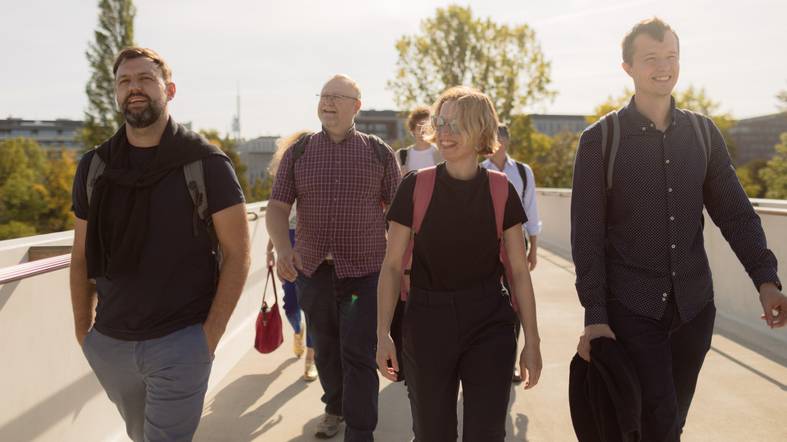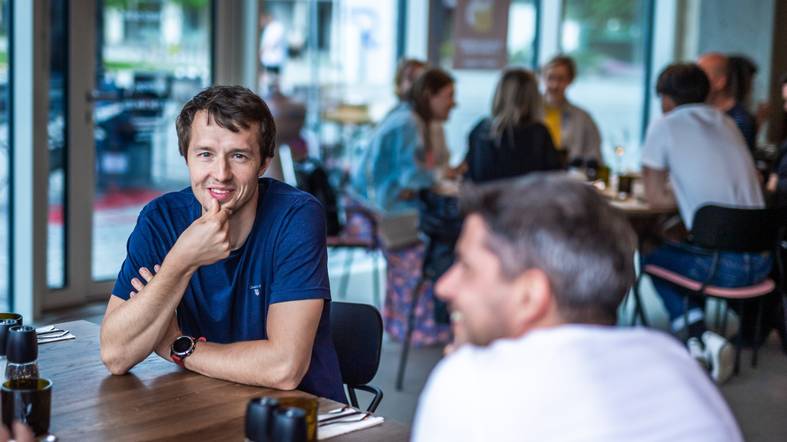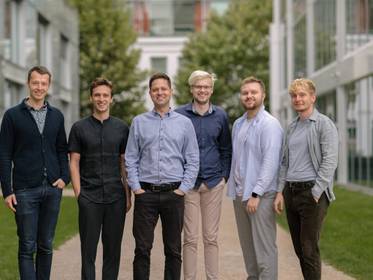Tomáš Hodboď
Tomáš joined the team of Miton partners in 2013 after a successful exit of the price comparison site Heureka, which he had helped to build. As co-founder and CEO, he launched the fashion search engine Glami, now a billion-dollar company operating in 18 countries (GLAMI's story). He also oversees the furniture search platform Biano and played a key role in building the fundraising platform Donio. Currently, he is seeking his next venture, focused on AI, with the aim of building it and bringing it to the global market.

Current projects
Glami
Biano
DeepScout
Past projects
Donio
Heureka
Investment areas
AI, augmented workforce
E-commerce
How would you describe your role at Miton?
My task at Miton is to seek out the next generation of services built on AI.
I enjoy talking with promising founders and often act as a co-founder. I believe the best way I can help a project succeed is by being on the front lines and helping build the company. I feel I should invest in projects that I can actively co-create.
How are things going with GLAMI and Biano?
GLAMI and Biano are now mature companies, and I’ve been with them for more than 10 years. I still know every detail of their technology and business models, and I can contribute to their future direction. However, I’m proud that these companies have grown with me, become independent, and are able to develop under their own management.
Which technology fascinates you the most right now?
At the moment, I am most fascinated by artificial intelligence. AI has the potential to fundamentally transform many industries, from healthcare to education, from financial services to manufacturing. It will change how we live and work, although no one knows exactly how just yet.
Trying to understand the development of the underlying technologies that enable us to build new, useful applications today is fascinating. I hope and believe that this kind of technology can democratize certain opportunities that are currently accessible to only a part of society.
What types of projects interest you the most, whether by segment or approach? Who can come to you with an idea?
My biggest experience is in e-commerce. I’ll never turn down a meeting about an idea in this space, and I love when I can test a product or concept myself as a user. I may not help you fund another e-shop today, but if you have an idea for an app that simplifies the user experience in B2C, I’ll definitely have a coffee with you.
However, my scope is broader now, and I’m interested in the application layer of services and tools that leverage current technological progress, enabling services to be built in ways that weren’t possible before.
The most interesting projects for me are those that try to solve global problems and have the potential to create a broader social impact, even if that begin within a relatively small vertical.
Here are some of the areas I’m deeply involved in today:
- Expanding job roles: AI will reshape most office jobs, and many new tools will emerge to make this possible.
- Healthcare: Projects aimed at improving diagnostics, treatment, and healthcare management. For example, startups working on personalized medicine or tools for remote patient monitoring that enable more efficient and accessible care.
- Education: Initiatives aimed at transforming traditional education systems through technology, such as personalized learning or massive open online courses (MOOCs). These projects can enhance the availability and quality of education on a global scale.
Your track record (being involved in the development of Heureka, GLAMI, and Donio) leads to the question: What’s your superpower?
I would say it’s my vision of what is possible. I can look at a company, industry, or concept, see its potential, and help determine a concrete way to reach that goal. I’m not always right, but I aim to be correct at least more than half the time. I also have a strong sense for assessing the potential of teams and individuals, which allows me to invest effectively in people and build teams.
How would you describe your working style?
My style is very results-oriented and focused on efficient use of resources, with an emphasis on fast iterations and continuous learning. I believe in a strategy where quick testing and learning from data leads to faster improvement and innovation. I approach work analytically, with a strong focus on data, which allows me to make better decisions.
I strive to build strong teams where everyone has the opportunity to contribute and grow. I value open communication and feedback, as I consider them essential for creating a creative culture.
Finally, I am very impact-driven. All of my business and investment activities are not only meant to generate money but also to bring about positive change in a broader sense.
Where do you spend most of your work time?
In offices, on-site with the teams I work with daily. I’d like to officially declare that the remote work experiment post-Covid is a thing of the past.
What advice do you often give to founders?
I think the most important thing is to be relentless. Startup life is not for the faint of heart. You have to be passionate, hardworking, and disciplined, and you have to be able to endure long hours, limited budgets, a constantly changing team, and doubts from investors, the media, and even your own customers or suppliers. It’s incredibly hard, but you just have to endure and keep moving forward. As Winston Churchill said, “If you’re going through hell, keep going.” You’ll also hear that when something isn’t working, you need to make tough decisions in a timely and decisive manner. And try to navigate through all that advice.
What’s the best part of your job?
That I have the honor of working with great founders. I get to work with amazing people and teams on new ideas – it’s hard to describe the energy, especially at the beginning, when new teams are being built, new ideas are forming, and we’re finding ways to bring them to life.
What’s the hardest part?
The hardest part is definitely failure. Seeing teams put in countless hours of time, energy, and money into creating a product, only to find out it won’t succeed.
Making difficult decisions with incomplete information, often affecting other people’s lives, and doing it quickly is very unpleasant.
You see how much effort the project took, and yet you have to write it off. But you have to keep going. You need to know that for every ten failures, there is one success, which is all the sweeter.
Which book do you most often give as a gift?
Zero to One by Peter Thiel is essential reading for any startup founder, offering a unique perspective on innovation and business. Thiel emphasizes that true success comes from creating something entirely new. In this way, we go from zero to one – creating value where none existed before. Thiel also discusses the importance of monopolies, long-term planning, and why most founders underestimate the power of original ideas. The book is a practical guide not only for building companies but also for long-term strategic thinking.
I also like to give people Shoe Dog by Phil Knight, the founder of Nike. He tells the story of how Nike was built from the ground up and all the challenges he and his team had to overcome to get to where they are today. It’s the perfect example of what an entrepreneur has to go through to create an iconic brand. I find it inspiring and it always reminds me of how resilient you have to be to build the best companies in the world.
Another book I often recommend and give is The Hard Thing About Hard Things by Ben Horowitz. It focuses on the tough aspects of running a startup that often aren’t covered in traditional business courses or literature.
Which podcast do you spend the most time with?
If I count the hours, it’s definitely Lex Fridman’s podcast. I should mention he has an unfair advantage since some episodes run up to six hours.
What’s passed the test of time for you, meaning something you’ve done regularly for many years?
It seems that some form of active sport – running, fitness, hiking – has stuck with me for a really long time. Whenever this part of my life is crowded out by other responsibilities, I notice I don’t feel as good.
What are five things you can’t live without?
I could live without my phone, headphones, coffee, and sports, but I’d be pretty grumpy.
What’s your favorite place?
I love escaping to the Jizera Mountains, far from people and close to the forest.
What would you do if Miton didn’t exist?
If Miton didn’t exist, I’d be looking for a way to start a new company. I’d probably be deeply involved in the development of a new tech project, figuring out how its product would work.
Stories with Tomáš
How to optimise pricing and assortment in e-commerce: Miton invests in DeepScout AI tool
(press release) DeepScout is a project of experienced founder Jan Mittner and the VC company Miton, which invested in "SimilarWeb for e-commerce" before the launch. It allows e-shops to access market and competitor data with a single click; thanks to AI, this is possible at a fraction of the current cost. The DeepScout platform also sees the opportunity to offer actionable insights over big data in other areas.
How Glami became a European player in online fashion: 5 key ingredients
It is one of those highly successful technology companies well-known among insiders but not seen that often in the media. In 10 years, Glami has become the largest search engine and online catalogue of fashion goods and accessories. It operates in 13 countries, and its customers place almost half a million orders a month. Thanks to Glami, online fashion stores will add CZK 4 billion to their sales this year. Of course, Glami, now led by CEO Ján Kešelák, didn't become a prominent and profitable international company by chance.
Donio wants to change the way crowdfunding works
The past few weeks have shown us two things. First, that getting financial help from the government is a slow and chaotic process. And second, that communities rule! When people decide to get together to support a clearly defined goal, amazing things happen. The fundraising platform Donio can help in both areas. At Miton we are proud that this soul-stirring project is now officially part of the group of companies into which we have invested.



-PA6y.jpg)
